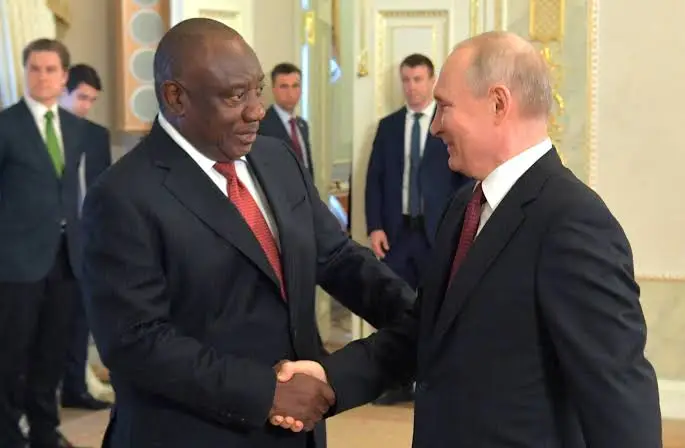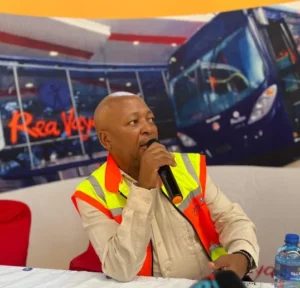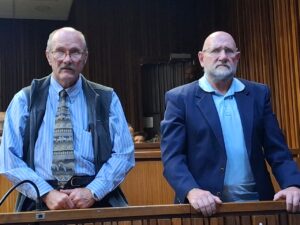By: Carl ‘Mpangazitha’ Niehaus*
Our late ANC President OR Tambo once stated “…let’s tell the truth to ourselves, even if the truth coincides with what the enemy is saying.” I have carefully perused President Ramaphosa’s “confidential affidavit” setting forth his position on the ICC arrest warrant against President Putin, and was momentarily convinced that South Africa was about to show real leadership. That is until Ramaphosa somersaulted and announced that President Putin will not attend a BRICS summit in South Africa next month in person. Seemingly, the decision allows South Africa, the host nation to avoid, the difficult predicament of whether to arrest the Russian leader, who is the subject of an international warrant. At the same time, it represents a despicable, shameless and indefensible betrayal of our sovereignty and solidifies our image as unprincipled, spineless lackeys of Western imperialism led by the USA.
Just yesterday, President Ramaphosa stated in his affidavit that South Africa would risk war with Russia if it arrested Mr. Putin at the summit. Although he now claims that the decision for Mr. Putin not to attend was made “by mutual agreement,” it is clear that the decision was made unilaterally by South Africa which retains the exclusive right to allow Putin to land on its soil. Contrary to the wild allegations of panic-mongers, South Africa is not a paralysed victim of circumstances and the execution of the Putin arrest warrant was not a foregone conclusion. Ramaphosa has correctly pointed out that South Africa as a fully sovereign state and signatory of the Rome Statute, has several options at its disposal which are being pursued in the ICC itself under Article 97 of the Rome Statute. Despite his correct stance Ramaphosa fails to challenge the Democratic Alliance’s application on the ground that the South African court has no jurisdiction on a warrant matter pending before the ICC, which issued the warrant in the first place. It would be lack of comity for our courts to pronounce on the merits of the said Putin arrest warrant. He allowed panic to dictate his course of action.
Ramaphosa’s affidavit slavishly mimics a paradigm that seeks to uphold the rule of “international law” as defined by Western imperialism and utterly fails to convey to the court a sense of a government focused on building a capable, ethical and developmental state which is a crucial facilitator for the successful execution of government’s goals of achieving the targets of the 2030 National Development Plan (NDP). It contains no world view which portrays BRICS as indispensable in the country’s charge towards a developmental state focussed on developing the economy, creating jobs and improving the living conditions of the oppressed black majority. It also fails to put into proper context the crucial role BRICS is poised to play in our national development and survival as a nation.
Ramaphosa correctly draws the court’s attention to Russia’s publicly declared warning that it views an arrest of President Putin as a declaration of war. Ramaphosa further spells out the serious national security implications for South Africa emanating from the execution of the ICC arrest warrant on its soil. A fatal error on his part is that he fails to challenge the judiciary to accord our national security interest enhanced weight. He fails to put into proper national security context the crucial role BRICS is poised to play in it. Ramaphosa is correct that South Africa’s fulfilment of its role as a member of the ICC requires more latitude in order to keep the country safe at all times – national security is no less pressing simply because the ICC arrest warrant involves a treaty obligation. No judiciary has the right to issue an order that requires us to commit a suicidal act in the name of vindicating international law.
As evidenced by the court’s order forcing the public disclosure of Ramaphosa’s “confidential” affidavit, the judiciary has overstepped its boundaries and set a dangerous precedent. The question of South Africa’s assessment of the credibility of the threat of war if Putin is arrested, the commander-in-chief’s preparedness and consideration of strategies to meet potential attack from Russia are all privileged, and such information must be protected from disclosure because there is a reasonable danger that disclosure would expose military matters which, in the interests of national security, should not be divulged. Ramaphosa failed to explain to the court that a dismissal was required because both the claims of the Democratic Alliance and the President’s possible defences are so infused with state secrets that the risk of disclosing them is both apparent and inevitable. Other than vague reliance on his obligation to the ICC he could not even explain why his affidavit was required to be “confidential” or protected from disclosure.
Article 97 of the Rome Statute provides, in relevant part, as follows:
“Where a State Party receives a request under [Part 9 of the Statute] in relation to which it identifies problems which may impede or prevent the execution of the request, that State shall consult with the Court without delay in order to resolve the matter. Such problems may include, inter alia: (c) The fact that execution of the request in its current form would require the requested State to breach a pre-existing treaty obligation undertaken with respect to another State”.
Clearly South Africa has received a request from the ICC regarding Putin’s warrant of arrest. As Ramaphosa correctly points out, he has identified “problems which may impede or prevent the execution of the request” and was busy consulting with the ICC “without delay in order to resolve the matter”. He has also highlighted the fact that execution of the ICC request in its current form would require South Africa to breach a pre-existing treaty obligation undertaken with respect to another State, Russia. Under Article 97 no South African judge has the authority to pre-empt South Africa’s ongoing consultation with the ICC as the statute envisages that there may be legitimate exceptions to a state’s execution of an arrest warrant. Only cowardice and lack of principles can explain Ramaphosa’s change of heart at this stage.
The cooperation regime, as set out in Part 9 of the Statute, makes a distinction between the obligations of States Parties to the Rome Statute (South Africa) on one hand, and cooperation by States not parties to the Statute (Russia) on the other hand. As concerns the former, Article 86 of the Statute stipulates the general obligation of States Parties to cooperate fully with the Court; the more specific obligations are set out in the subsequent articles. Cooperation of States not parties to the Statute is addressed in Article 87(5), which provides, in its sub-paragraph (a), that the Court may ‘invite any State not party to [the] Statute to provide assistance under [Part 9 of the Statute] on the basis of an ad hoc arrangement, an agreement with such State or any other appropriate basis’. Given Russia’s uncompromising and well-known stance to the effect that an arrest of its President would be considered an act of war warranting immediate retaliatory response, South Africa is entitled to ask the ICC to exercise its remedies it has under Article 87(5). It must insist that given the predictable disastrous outcome of any attempt to arrest Putin on South African soil, the ICC must itself ”‘invite [Russia] any State not party to [the] Statute to provide assistance under [Part 9 of the Statute] on the basis of an ad hoc arrangement, an agreement with such State or any other appropriate basis”. Even if the predictable outcome of such ICC invitation to Russia would be negative, the burden of taming a nuclear-armed Russia cannot and must not be unfairly shifted to a poorly resourced country like South Africa, under the guise of enforcing international law.
The reality is that the efficacy of an enforcement of an ICC arrest depends on the relative strength and military power of the targeted state and the state party to the Rome Statute. Even on domestic laws, ordinary unarmed civilians are never asked to put their lives at risk by apprehending armed and dangerous criminals who may be at large. As explained below, no principle of international law may require a country to risk its annihilation by engaging in an act of war against a nuclear armed state where the latter has made it clear that there would be a swift retaliatory response for such acts. The ICC may not use South Africa as a guinea pig to test Russia’s resolve for draconian action on the issue of the arrest warrant for Putin.
Given that Russia is not party to the Rome Statute, any cooperation would therefore fall under Article 87(5) of the Statute. This would mean that it is open to Russia to enter into ad hoc arrangements or agreements with the ICC regarding cooperation, but that it is not required to do so, and that, in the absence of such an arrangement or agreement, there is simply no obligation for Russia to cooperate with the ICC. There is no evidence that the ICC has explored the cooperation option with Russia, before imposing on South Africa the obligation to arrest Putin. It is not within the competence of a South African court to force the ICC to explore that option. Notwithstanding any refusal by Russia to cooperate, the ICC cannot shift the burden of taming Russia to poor third world countries to engage in suicidal acts such as effecting an arrest of the head of state of a world power who happens to be present on their soil. As a tactical move, the idea of South Africa seeking “consultation” with the ICC on the issue is simply to put the ball back in the ICC’s “court” to force it to deal with the impossible task it unreasonably expects South Africa to handle alone. It is irrelevant whether Ramaphosa genuinely seeks consultation with the ICC on the merits, or merely uses the consultation approach to give the DA and others a “Phala Phala slip” as he did to Parliament.
Ramaphosa’s affidavit eloquently exposes the point that the ICC and other pro-Western propagandists have assiduously tried to avoid – the issue of impunity and retaliatory action of the nuclear armed world powers vis-a-vis the state requested to arrest the head of state of a foreign power, and punitive measures against the ICC itself.
One recalls that President Donald Trump issued Executive Order 13928 on June 11, 2020, declaring a national emergency and authorising asset freezes and family entry bans against ICC officials. The Executive Order specifically states that a declaration of an “unusual and extraordinary threat to the national security and foreign policy of the United States” exists because of the ICC’s “assertions of jurisdiction over personnel of the United States and certain of its allies, including the ICC Prosecutor’s investigation into actions allegedly committed by United States military, intelligence, and other personnel in or relating to Afghanistan, threatens to subject current and former United States government and allied officials to harassment, abuse, and possible arrest.”
On September 2, 2020, the United States imposed sanctions on the ICC prosecutor, Fatou Bensouda, and another senior ICC official, Phakiso Mochochoko. Both were added to the Specially Designated Nationals and Blocked Persons List (the SDN List) through authority created by the Executive Order. Any person making a contribution of “services” to persons designated for sanctions – the Prosecutor or her senior aide – could be subject to civil and criminal penalties. The ICC was left powerless to resist, and could only issue a pathetic statement as follows:
“The International Criminal Court (“ICC” or “Court”) condemns the economic sanctions imposed by the US earlier today on the Court’s Prosecutor and a member of her Office.
The new measures, announced pursuant to the US Executive Order 13928 dated 11 June 2020, are another attempt to interfere with the Court’s judicial and prosecutorial independence and crucial work to address grave crimes of concern to the international community as mandated under the ICC Rome Statute.
These coercive acts, directed at an international judicial institution and its civil servants, are unprecedented and constitute serious attacks against the Court, the Rome Statute system of international criminal justice, and the rule of law more generally.
The Court continues to stand firmly by its personnel and its mission of fighting impunity for the world’s most serious crimes under international law, independently and impartially, in accordance with its mandate. In doing so, the Court benefits from the strong support and commitment of two thirds of the world’s States which are parties to the Rome Statute”.
See, International Criminal Court condemns US economic sanctions; Press Release, 2 September 2020 https://www.icc-cpi.int/news/international-criminal-court-condemns-us-economic-sanctions
Although the sanctions were subsequently lifted by Antony Blinken in April 2021, the Americans have kept their uncompromising stance on the ICC as reflected in their legislation, the American Service-Members’ Protection Act (ASPA), 116 Stat. 820. This authorises the President of the United States to use “all means necessary and appropriate to bring about the release of any US or allied personnel being detained or imprisoned by, on behalf of, or at the request of the International Criminal Court”. By the same logic, Russia is entitled to use “all means necessary and appropriate” to bring about the release of its President being “detained or imprisoned by, on behalf of, or at the request of the International Criminal Court”. The ICC must explain why South Africa must face an existential risk by arresting a Russian president under circumstances where an American president would never be arrested or detained even in the face of an arrest warrant from the ICC. Has the pro-western Ramaphosa articulated these concerns to the ICC?
Even where the ICC investigations involve close US allies such as Israel, as opposed to US citizens, the US government has felt emboldened to use sanctions as a shield for its allies such as Israel. On May 15, 2020 US Secretary of State Mike Pompeo vowed to “exact consequences” if the ICC “continues down its current course” – that is, if the court moves forward with a Palestine investigation. The sanctions can be applied on a “case-by-case basis” in relation to ICC investigations of US personnel or personnel of US allies. The ICC has taken no credible steps to hold the US government to account for its egregious assault on the global rule of law and threats to the ICC. This begs the question – if the ICC is powerless to protect even its own prosecutors and personnel against retaliatory action by superpowers who commit and cover up grave abuses how are small powerless countries like Malawi or South Africa expected to defend themselves against any superpower in the event of a retaliatory attack for having the temerity to execute an ICC arrest warrant for the leader of a powerful state wanted by the ICC? Does our country have to willingly commit suicide in order to vindicate “the rule of law more generally”? The US, which is not a party to the court’s Rome Statute, objects to the ICC’s jurisdiction over nationals of non-member countries, absent a referral to the court by the United Nations Security Council. Russia is also not an ICC member country. Our courts in South Africa must not engage in show-boating under the guise of enforcing international law. Unfortunately Ramaphosa’s handlers have now resorted to using the courts to maintain imperialist domination of our country.
I am reinforced in this argument by Article 98(1) of the Statute which is a procedural rule that determines how the Court is to proceed where any immunity exists such that it could stand in the way of a request for cooperation. Ramaphosa failed to articulate the established international law principle that the requested State (South Africa) is nothing more than the Court’s (ICC) agent in executing the Court’s arrest warrant, and consequently, the enforcement jurisdiction being exercised is that of the Court and not that of the requested State. The DA’s application could have been attacked on jurisdictional grounds especially where the ICC is seized with the matter and there are ongoing consultations with South Africa.
Another weakness in Ramaphosa’s affidavit is that it slavishly mimics a paradigm that seeks to uphold the rule of “international law” as defined by western imperialism and utterly fails to convey to the court a sense of government focused on building a capable, ethical and developmental state which is a crucial facilitator for the successful execution of government’s goals of achieving the targets of the 2030 National Development Plan. Almost universally, courts have deferred to the national executive when it comes to national security assessment, diplomacy and foreign policy matters. In the UK, this principle was demonstrated by the decision of the House of Lords in the case of Secretary of State for the Home Department v Rehman [2001] UKHL 47; [2003] 1 AC 153. which was concerned with an appeal against a deportation decision made on the basis that “the Secretary of State deems [the person’s] deportation to be conducive to the public good”. In forming that view in relation to Mr Rehman, the Secretary of State relied on interests of national security.
As Lord Hoffman explained, the exercise of judicial function must recognise the constitutional boundaries between judicial, executive and legislative power. As Lord Hoffmann explained, the question of whether something was in the interests of national security was not a question of law: “It is a matter of judgment and policy. Under the constitution of the United Kingdom and most other countries, decisions as to whether something is or is not in the interests of national security are not a matter for judicial decision. They are entrusted to the executive.” Finally, Lord Hoffmann explained the importance of democratic accountability for decisions on matters of national security: “It is not only that the executive has access to special information and expertise in these matters. It is also that such decisions, with serious potential results for the community, require a legitimacy which can be conferred only by entrusting them to persons responsible to the community through the democratic process. If the people are to accept the consequences of such decisions, they must be made by persons whom the people have elected and whom they can remove.” These points have been reiterated in later cases, including the recent Shamima Begum case where the UK Supremre Court upheld the home secretary’s decision to cancel Shamima Begum’s citizenship citing national security.
In a similar vein, the USA courts judgments reveal that the courts saw their role in national security cases as extremely limited, reflecting long-standing judicial reluctance to be perceived as second-guessing the executive branch on matters relating to foreign policy and national security. As Epstein v. Resor, (1970) stated: “what is desirable in the interest of national defence and foreign policy is not the sort of question that courts are designed to deal with.” National security, military matters and foreign relations are “‘quintessential sources of political questions.'” See El-Shifa, 607 F.3d at 841; see also Haig v. Agee, 453 U.S. 280, 292 (1981) (explaining that “matters intimately related to foreign policy and national security are rarely proper subjects for judicial intervention”). Cases involving national security and foreign relations “raise issues that ‘frequently turn on standards that defy judicial application’ or ‘involve the exercise of a discretion demonstrably committed to the executive or legislature.'”El-Shifa, 607 F.3d at 841 (quoting Baker, 369 U.S. at 211). Unlike the political branches, the Judiciary has “no covert agents, no intelligence sources, and no policy advisors.” See Schneider, 412 F.3d at 196. Courts are thus institutionally ill-equipped “to assess the nature of battlefield decisions,”DaCosta v. Laird, 471 F.2d 1146, 1155 (2d Cir. 1973), or to “define the standard for the government’s use of covert operations in conjunction with political turmoil in another country,” Schneider, 412 F.3d at 197. These types of decisions involve “delicate, complex” policy judgments with “large elements of prophecy,” and “are decisions of a kind for which the Judiciary has neither aptitude, facilities, nor responsibility.” Chicago S. Air Lines v. Waterman Corp., 333 U.S. 103, 111 (1948).
In El-Shifa v. United States the court examined whether the political question doctrine barred judicial resolution of claims by owners of a Sudanese pharmaceutical plant who brought suit seeking to recover damages after their plant was destroyed by an American cruise missile. President Clinton had ordered the missile strike in light of intelligence indicating that the plant was “‘associated with the [Osama] bin Ladin network’ and ‘involved in the production of materials for chemical weapons.'” El-Shifa, 607 F.3d at 838. Dismissing the plaintiffs’ claims as non-justiciable under the political question doctrine, the D.C. Circuit explained that “[i]n military matters . . . the courts lack the competence to assess the strategic decision to employ force or to create standards to determine whether the use of force was justified or well-founded.”Id. at 844. Rather than endeavour to resolve questions beyond the Judiciary’s institutional competence, the court held that “[i]f the political question doctrine means anything in the arena of national security and foreign relations, it means the courts cannot assess the merits of the President’s decision to launch an attack on a foreign target.” Id.
Ramaphosa has misperceived what the DA mischievously asks the Court to do— assess the merits of the President’s (alleged) decision not to execute an ICC warrant on a foreign head of state as a means to avoid war with Russia. He failed to argue that national security and risk assessment by him as commander in chief counselled against judicial resolution of the DA’s premature application. Just as in El-Shifa, any judicial determination as to the propriety of arresting Putin would require the court to elucidate the standards that are to guide a President when he evaluates the threat of war stemming from an ICC arrest warrant, the veracity of Russia’s vow to declare war on us, military intelligence and the country’s military capability to resist a retaliatory Russian response are all matters exclusively assigned to him under the constitution.
The Al Bashir precedent is simply inapplicable – there are no judicially manageable standards by which courts can endeavour to assess the execution of an ICC arrest warrant in the face of credible retaliatory response by Russia, the President’s interpretation of military intelligence and his resulting decision — based on that intelligence — whether to risk it all by executing the ICC warrant and mobilising our military forces against Russia or refusing to enforce the ICC warrant. A disciplined judiciary would find it difficult, if not extraordinary, for courts to discover and announce the threshold standard by which the South African government evaluates intelligence in making a decision to commit an act Russia views as tantamount to war. Nor are there judicially manageable standards by which courts may determine the nature and magnitude of the national security threat posed by arresting a particular head of state. Instead of letting the domestic courts and the ICC resolve the legal questions, Ramaphosa did what he accomplished in the Phala Phala enquiry but that only postpones a resolution of the issues until another head of state visits our shores.
The ANC has lost sight of the potential benefits our people are destined to receive from BRICS membership. BRICS nations launched the New Development Bank as an alternative to the World Bank and the International Monetary Fund. Many developing and emerging economies are interested in joining the BRICS because they had painful experiences with the IMF’s structural adjustment programs and austerity measures. With economic powerhouses such as Saudi Arabia,United Arab Emirates, Egypt, Algeria, Nigeria, Iran, Indonesia, Argentina and Mexico poised to join BRICS, true inclusive multilateralism of the type with which all BRICS members would, in principle, be aligned involves the reform of institutions of global governance, especially the United Nations Security Council would become a reality. Ramaphosa has not only disgraced his corrupt ANC but he has let down millions of Africans who hope for a better future in BRICS. As Indian Minister of External Affairs Jaishankar said at the recent BRICS gathering in Cape Town BRICS must “send out a strong message that the world is multipolar, that it is rebalancing and that old ways cannot address new situations”.
It would be a grave error to view the pressure on South Africa in isolation – it is a concerted imperialist effort to destroy the BRICS. True, the ICC has issued an arrest warrant for President Putin over the allegations of war crimes and human rights abuses. But in August 2022 the UN High Commissioner for Human Rights (OHCHR) report on China said that the extent of arbitrary detentions against Uyghur and others, in context of “restrictions and deprivation more generally of fundamental rights, enjoyed individually and collectively, may constitute international crimes, in particular crimes against humanity.”
Likewise a US report has listed significant human rights issues in India in 2022, including unlawful and arbitrary killings, freedom of press and violence targeting religious and ethnic minorities. The annual report, released by US Secretary of State Antony Blinken, mentions human rights violations such as extrajudicial killings, torture or cruel, inhuman, or degrading treatment or punishment by police and prison officials, and harsh and life-threatening prison conditions. It claims that human rights abuses in Jammu and Kashmir range from mass killings, enforced disappearances, torture, rape and sexual abuse to political repression and suppression of freedom of speech. It is just a matter of time before countries such as China, India and many of the new BRICS nations are also subjected to the treatment meted out to Russia. How long can the ANC run without taking a brave stance against imperialism and capitalist exploitation?









You really have to stop with this “comrade” “revolution” “mpangazitha” rubbish…you realise how ridiculous you sound, comrade…..and those creepy 1990’s suits have to go…hilarious!